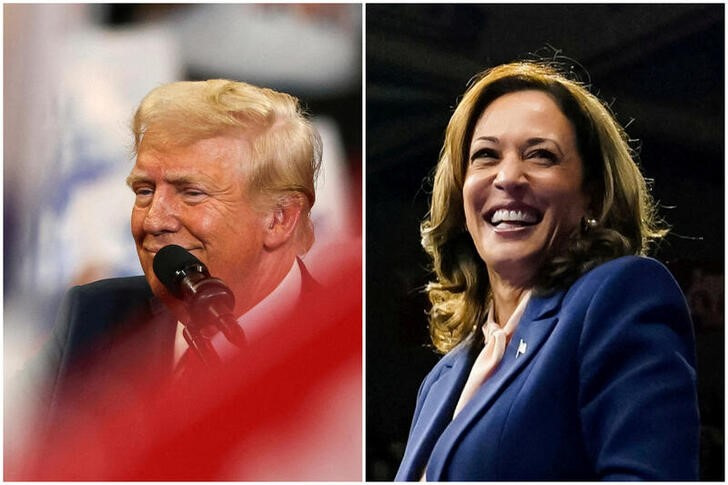Investing.com — Both candidates for the upcoming U.S. presidential election are expected to widen the budget deficit, analysts at Danske Bank said in a Thursday note.
Kamala Harris was seen as the victor in the first presidential debate against Donald Trump. Harris impressed with her progressive outlook, focusing on topics like abortion, the rule of law, and foreign policy, particularly regarding the conflicts in Ukraine and Gaza.
In contrast, Trump concentrated on criticizing the current administration but failed to offer specific plans or initiatives.
The debate’s impact was immediately reflected in prediction markets, where Harris now leads Trump with a 55% to 45% margin, a significant change from their previous near-equal standing.
Post-debate polls also show Harris performing well, although the race in key swing states remains highly competitive.
Harris holds a slim advantage in Nevada and Wisconsin, while Trump is slightly ahead in Arizona and North Carolina. The potential delegate count stands at 242 for Harris and 246 for Trump, with 50 delegates still undecided from Michigan, Pennsylvania, and Georgia.
“Both candidates would need to win 2/3 of the tied states to clinch the victory,” Danske Bank analysts noted. “Historically, Pennsylvania has voted for the winning candidate, and securing it has also led to victories in Michigan and Wisconsin in the past eight elections.”
In terms of the economy, analysts said that both candidates are expected to increase the budget deficit beyond the current Congressional Budget Office (CBO) forecast of a $1.9 trillion deficit, or -6.5% of GDP, by 2025.
Harris plans to follow much of Biden’s FY2025 budget, with tax reductions for lower and middle-income families, enhanced tax credits, and healthcare subsidies, partially offset by higher corporate taxes.
Her proposal to reintroduce the Child Tax Credit could raise the deficit by an average of $133.5 billion each year over the next four years, increasing the GDP deficit percentage by an average of 0.4 percentage points.
Trump’s budget proposals, on the other hand, would lead to greater deficit increases by extending the 2017 Tax Cuts and Jobs Act, reducing corporate taxes, and removing income taxes on Social Security benefits.
For example, maintaining the individual tax provisions from the TCJA would add an average of $260 billion to the deficit each year over the next four years, which would expand the GDP deficit percentage by an average of 0.8 percentage points.
Despite Trump’s plans likely leading to a larger deficit, 37% of respondents in post-debate polls believe he is more likely to focus on reducing debt, compared to 30% for Harris, with another 30% expressing no preference.
“Besides changes in public spending, the implications for economic growth matter for the deficits as well,” analysts continued. “Trump’s proposed tariff increases have been estimated to counteract most, if not all of the positive growth impact from easier tax policies.”
The ability of either candidate to implement their policies is uncertain, with a political deadlock possible.
Republicans are currently favored to take back control in the Senate, which could also enhance their chances of winning all three upcoming elections.
Prediction markets give a 28.5% chance for a Republican sweep against a 21.5% chance for the Democrats. However, the gap has narrowed following the Federal Reserve’s larger-than-expected rate cut, which might provide economic tailwinds.

